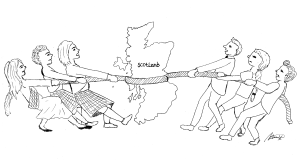
 Many people have looked at the economic issues as the main reason to vote “yes” or “no” in the upcoming referendum. However, I do not see the issue as one of economics or politics, but rather an issue of identity.
Many people have looked at the economic issues as the main reason to vote “yes” or “no” in the upcoming referendum. However, I do not see the issue as one of economics or politics, but rather an issue of identity.
If there were an all-inclusive British cultural identity, Scotland would not be deciding whether to secede or not at the present moment.
When someone meets me on campus for the first time, they ask, “Are you British?” I always reply, unintentionally, “Yes, I am English.”
For me the association of Britain and England are one and the same, because I grew up in England, where St. George’s Day is celebrated, Sunday Roast is considered the national dish and every World Cup performance is a disappointment.
As part of my cultural upbringing I have never experienced Scottish haggis or Hogmanay (New Year’s Eve), Northern Irish Marching Season or Welsh laverbread (seaweed pancakes). If you asked a foreigner to name things or customs that are British, they would probably mark out items or customs that are present somewhere in the United Kingdom but not in all of the four nations: England, Scotland, Wales and Northern Ireland.
The modern definition of the nation-state is an entity where a geopolitical entity is combined with a cultural or ethnic union. Britain does not meet this definition, as it has no clear ethnic or cultural identity. The British Isles are an ethnically diverse place, so the particular nationalism that is present in the ideology of the Scottish National Party is one of civic nationalism. Civic nationalism accepts all those who join together, regardless of race, in sharing and embracing a shared culture and history.
Scotland has its own traditional language of Scottish Gaelic, but the great influence of Germanic people on the British Isles created the Scots language. As any person who has ever heard a Scottish person speak, the resemblance to an English dialect is limited. Robert Burns, Scotland’s national literary father, wrote “Auld Lang Syne” in Scots, not English. These languages only grew closer together as languages with the advent of radio and television. This does not erode the fact that they have different linguistic roots.
Before 1707, English culture developed separately to those of Scotland, Wales and Northern Ireland. Each nation has national heroes, many of whom often fought with each other.
William Wallace and Robert the Bruce are beloved in Scotland for the fact that they defeated the English. Llywelyn the Last is famed in Wales for putting up a fierce resistance to the English King Edward I. The English national anthem after the Jacobite Rebellion of 1745, when Charles Edward Stuart tried to reclaim the throne for House of Stuart, had an additional verse “may he sedition hush/ and like a torrent rush/ Rebellious Scots to crush.” The Protestant Northern Irish celebrate the victory of William III over Irish Catholics at the Battle of the Boyne. The history of the British Isles has been defined by the relationships of the peoples in the British Isles, and they have not often gotten on.
Independence can and will lead to better understanding and interaction among the cultures of Great Britain, because they are unique and separate cultures. The United Kingdom was created through English dominance in the local political arena, and there are no cultural grounds for its sustainment in the modern day and age.
While there are many people who think of themselves as British, I find that would be a secondary association (Northern Ireland being the exception, as their Irishness is in relation to that of the Republic of Ireland).
The members of the British Isles have cultural gaps that cannot be rectified within a union. A breakup of the United Kingdom would allow those who understand their own national issues best to rectify those issues.
A vote for independence Thursday is a step forward to restoring a cultural and political balance of power, and each of the Home Nations can move on and embrace their own identity rather than some false concept of Britishness.
Michael Newton is a sophomore in the School of Foreign Service, originally from Bracknell, Berkshire, United Kingdom. He is a member of the Brilliantly British Club board.









